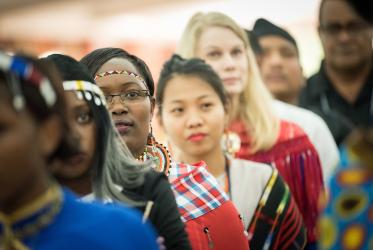On the 28th Quadrennial Assembly of the National Council of Churches in India (NCCI), held in Jabalpur from 27-30 April, Rev. Dr Sang Chang, World Council of Churches (WCC) president for Asia, urged Indian churches to commit themselves afresh to the task of building just and inclusive communities.
Delivering the keynote address on the theme “Towards Just and Inclusive Communities,” Chang said the challenge for Indian churches was to convert the assembly into a kairotic moment for the life of Indian churches by reinterpreting the assembly theme afresh for the times. “What does it mean for the church in India to be a community of the resurrection in this context of cross-bearing communities?” asked Chang during the opening ceremony, which took place at Christ Church Cathedral and was attended by representatives of several major Protestant and Orthodox Churches in India and related ecumenical organizations.
Urging the churches to revisit ideas of hospitality and solidarity, Chang said: “As the church seeks to build just and inclusive communities, it is important to understand Christian solidarity with the marginalized as the giving up of space, and power too, and learning to become allies with the marginalized. The challenge for the dominant church is not to set the agenda for liberation for the marginalized communities but adopt an attitude of kenosis — self-emptying — and serve the agendas of the marginalized by participating in their struggles for life.”
WCC general secretary Rev. Dr Olav Fykse Tveit, in a written greeting, reflected on the NCCI’s assembly theme.
Tveit wrote: “This theme has been dear to the World Council of Churches, which envisaged its project on just and inclusive communities as an effective instrument to work toward Jesus’s vision of life in all its fullness for several years. Today the vision of just and inclusive communities continues to provide the moral impetus and inspiration for the WCC’s umbrella theme of the pilgrimage of justice and peace.”
Tveit acknowledged that “a world divided by exclusion and damaged by economic and ecological exploitation is an aberration of God’s vision of shalom – that vision where steadfast love and faithfulness will meet and righteousness and peace will kiss each other” (Psalms 85:10).
Tveit reiterated that only through collaborative, concerted and compassionate efforts to overcome injustice and exclusion can churches become what the prophet Isaiah calls, “repairers of the breach and restorers of the paths for habitation” (Isaiah 58:12).
Mr Dinesh Suna, coordinator of the WCC Ecumenical Water Network, and Rev. Dr Peniel Rajkumar, programme executive for Interreligious Dialogue and Cooperation, participated in the NCCI assembly. They delivered presentations on the assembly theme and also addressed several pre-assembly gatherings.
The NCCI also elected a new set of leaders for 2016-2020. Rt. Rev. Dr P. C. Singh, bishop of the Jabalpur Diocese, Church of North India, and deputy moderator of the Church of North India, was elected as NCCI president. Rev. Dr Ratnakara Sadananda, Ms Aleyamma Thomas and Mr Liju Jacob Kuriakose were elected as the vice presidents, and Rev. Dr A. G. Augustine Jeyakumar was elected as treasurer. Rev. Dr Roger Gaikwad will continue as general secretary.









